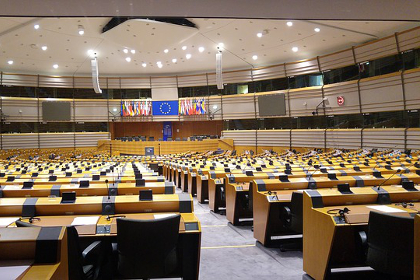
European Parliament Supports Re-Authorization of Glyphosate Herbicides for 7 Years
The European Parliament agreed Wednesday to a new 7-year authorization until 2023 for the controversial herbicide glyphosate, against the 15-year re-authorization originally proposed by the European Commission. The Parliamentary GUE/NGL Group had advocated a total ban on the substance.
April 13, 2016 | Source: Sustainable Pulse | by
The European Parliament agreed Wednesday to a new 7-year authorization until 2023 for the controversial herbicide glyphosate, against the 15-year re-authorization originally proposed by the European Commission. The Parliamentary GUE/NGL Group had advocated a total ban on the substance.
This European Parliament vote is non-binding on the European Commission and EU member states, but arguably carries moral weight. The EU member states will take the final vote in May.
GM Watch stated: “While this is not the ban that we and many groups wanted, the European Parliament asks for significant restrictions on glyphosate use”:
- No approval of non-professional use
- No approval in or close to public parks/playgrounds/gardens
- No approval where integrated pest management systems are sufficient for necessary weed control
- Strict limitations on pre-harvest applications (desiccation), which are deemed unacceptable
Source: www.guengl.eu
Czech MEP Kateřina Konečná, GUE/NGL coordinator on the Parliament’s Committee on the Environment and Public Health, said: “I am really disappointed by the outcome of today’s vote on our objection to the re-authorization of the glyphosate herbicide. Our objection has been distorted. Some really bad amendments were tabled by right-wing groups in order to weaken a ban on glyphosate in the resolution and, unfortunately, they were approved.”
Nearly 700 MEPs voted on the 7-year licensing of glyphosate and the vote was passed by 374 votes in favor to 225 votes against.
The MEPs failed to recognize the warning signs sent by the World Health Organization last year when their cancer agency IARC announced that glyphosate was a “probable human carcinogen“.
The vote to re-register glyphosate was originally delayed following the Great Glyphosate Rebellion in March, in which many countries across the EU stated they would vote against a new license for the chemical.
Reuters reported last Friday that France’s health and safety agency (ANSES) decided to ban weedkillers that combine chemicals glyphosate and the adjuvant tallowamine due to uncertainty over possible health risks, the agency said on Friday.
“Right-wing groups succeeded in passing their amendment calling on the Commission to renew the approval of glyphosate for another 7 years. Glyphosate is ‘carcinogenic’ to animals and ‘probably carcinogenic’ to humans and its authorization should not be renewed. This is an outrageous gamble with the health of European citizens by the Commission and right-wing groups. And it also goes against the wishes of two-thirds of EU citizens. Today it is big corporations like Monsanto that have won and the health of European citizens that has lost,” Konečná concluded.
Dutch GUE/NGL MEP Anja Hazekamp added; “It is disappointing that the European Parliament has put the importance of the profits of multinationals like Monsanto over our environment and the health of people and animals.”
“The widespread use and carcinogenic effects of glyphosate are a dangerous combination. This poison is found in rivers, ground water and in our food. Research shows that half of all people in Europe have glyphosate traces their bodies. 1.5 million people signed a petition against glyphosate and as many as two-thirds of all Europeans want a ban on the substance. Glyphosate is almost impossible to avoid and should be taken off the market now that the safety for humans and animals cannot be guaranteed,” MEP Hazekamp concluded.
